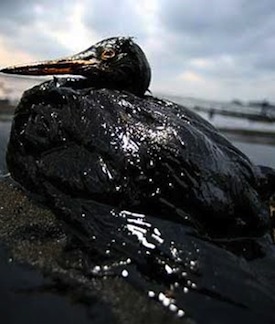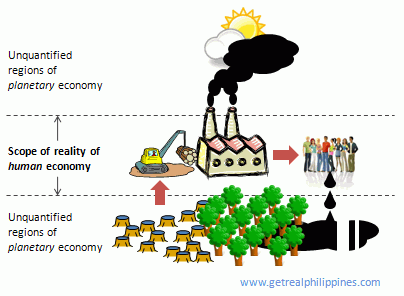Development in understanding in recent years is making real limits on growth a lot more palpable since it is becoming quite evident that our approach to measuring economic value and the costs of acquiring said “value” (i.e. our monetary system) is woefully incomplete. Yet economic growth remains the be-all-end-all that pervades every aspect of human aspiration. Corporations scramble over one another to get into the next market to expand into. Shoppers are continually trawling vast malls looking for the next must have. Credit is wantonly extended to grease the entire endeavour.

Consider the resource water. We see water as a virtually “free” resource. Because we think of it as “free”, we use copious amounts of it — we flush drinkable grades of this resource down our toilets and use it to wash our cars. Our monetary system is good at counting the costs and benefits of piping massive volumes of water to people’s homes — to the point that many households take the idea of water bursting out of a tap at a quick twist of the wrist for granted (which is why we perceive it as “free”). But what the monetary system does not count is the environmental cost of this “efficiency” — costs, we are finding out now, when accumulated past a critical point may tip the ecosystem into a state that results in this once abundant resource simply vanishing in the blink of an eye (relative to geological timescales) or gushing in in destructive quantities.
| SUPPORT INDEPENDENT SOCIAL COMMENTARY! Subscribe to our Substack community GRP Insider to receive by email our in-depth free weekly newsletter. Subscribe to our Substack newsletter, GRP Insider! Learn more |
Little trinkets imported all the way from China are another one of those perceived “free” resources. They seem free (or cost next to nothing) because we’ve developed technologies and systems that enable us to take vast amounts of raw material from the Earth and turn these into vast quantities of “products” that can be sold for more money than the monetary cost of said raw materials. The monetary system tells us such activities are “profitable” and the consultants will use this “fact” to tell us these activities “add value”. And because they are “profitable” and “add value”, more people start enterprises that undertake similar activities. Governments note the additional “value” added by every new “profitable” activity started and extols this as economic growth.
The monetary system (and the human-centric “economy” that it measures in its sadly limited way) scores the efficiency and productivity of the pipeline of human enterprise that extracts Earthly resources and turns these into consumable products and services. What the monetary system does not account for is the cost to the Earth of the waste products generated by this pipeline and the degradation caused by extraction of raw input into this pipeline.

The monetary system that measures the performance of the human economy rewards development of humans’ capability to acquire and accumulate and assumes an infinite capacity in the planet to support the means to acquire and accumulate.
So the concept of “generating wealth” (which increasingly seems to be a euphemism to mask a flawed assumption that economic growth is limitless) may no longer be a long-term option. The more pragmatic approach seems to be more around sustaining living standards for those who are already wealthy and hitting the brakes on escalating commitments for those who are still poor.
The concept of perpetually pursuing “growth” is a modern-day abomination created by an extremist free market system and, specifically, publicly-traded equity instruments driven by “investors” (or, more appropriately, parasitical equity traders) pursuing short-term “capital” gains. Unfettered population growth, “open” markets, and “deregulation” all contribute to lubricating and steepening the already slippery slope to the catastrophic collapse long ago foreseen by Jared Diamond in his seminal book Collapse. He makes this biting observation of a small cross-section of the fatal flaw in the concept of “globalisation” that is increasingly becoming evident but continuously swept under the rug…
It’s really ironic that the British Empire was founded on exploiting poor, helpless third world countries by getting those countries to export their raw materials to Britain, who would then export back its finished products. Now let’s think of the situation in modern Australia. Japan, the most forested country in the first world, is buying timber from the least forested country in the first world. They’re buying it at very low prices, as woodchips, then it processes them in Japan, so the value increases by a hundred, and then Japan proceeds to export TV sets and cars back to Australia. Yet Australia is not some ignorant third world country. Why is [the government] so economically short-sighted as to export cheaply something that is in such desperately short supply here, so that they can buy their expensive TV sets and cars from Japan? It’s as if the Japanese government were manipulating the Australian Prime Minister.
Big enough problems in the First World, think now of what this means to basketcase Third World countries like the Philippines. We continue to mask an obvious runaway addiction to locking ourselves into commitments we are inherently unable to honour by prostituting ourselves to foreign “investment” and deregulated foreign trade without a commensurate improvement in our ability to produce and sustain.
benign0 is the Webmaster of GetRealPhilippines.com.
There is a growing movement that questions the merits of economic growth. There is a fundamental conflict between economic growth and environmental protection. Too much economic growth has resulted in natural capital being transferred from the economy of nature into the human economy faster than it can be naturally replaced. Wastes and pollution are emitted back to earth faster than they can be assimilated.
A great source that explains the economic logic behind a steady state economy is Brian Czech’s Supply Shock: Economic Growth at the Crossroads and The Steady State Solution.
See http://supplyshock.org
A position statement offered by Center for the Advancement of the Steady State Economy (CASSE) provides a unique opportunity to take a stand on this issue. Signing CASSE’s position statement is an easy and powerful action people can take to show that they believe economic growth is having adverse effects in today’s full world, such as climate change.
Sign at: http://steadystate.org/act/sign-the-position/
WARNING: Spoilers for the ‘Doctor Who’ TV series – This is
the second part of a series featuring the companions of the British science fiction television series,
‘Doctor Who’. Whether you get through to the court on the
prisoner bus as bedraggled like a junk yard dog, or perhaps in your very best attire,
polished and squeaky clean, the very first order of business is going to be hearing the lengthy and informative discourse issued by the
presiding judge. Since there are no set classes,
players are free to design their own: do you want to be a healer.